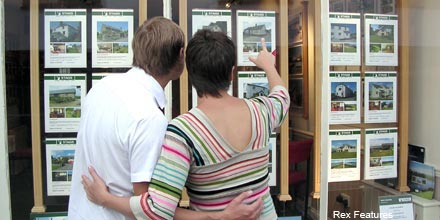Property prices are on the up...at least for another decade
02-09-2014

A slew of house price data backs up fears not just of a bubble, but that prices could increase for another 10 years.
by Michelle McGagh
Fears that the UK is heading for a housing bubble have been revived by chancellor George Osborne who has said property prices could continue to rise for another decade.
The problem of demand outstripping supply, which has pushed up prices across the country, but particularly in London and the South East over the past year, will ensure property prices continue to increase.
Giving evidence to the Economic Affairs Committee, Osborne said the country needed more homes and that a lack of homes could remain a problem until 2024.
‘I don’t pretend this problem is going to be solved in a few months or a couple of years. This is a big challenge for our country. We have got to build more homes,’ he said. ‘Imagine if we were to assemble again in 10 years’ time we would still be talking about the challenge of making sure that our housing supply keeps up with demand.’
While house prices still remain below their 2007 peaks, there is no doubt that prices are rising rapidly and could hit pre- financial crisis levels soon if the housing shortage is not tackled.
Just 107,950 new homes were built in 2012-13, less than half the 300,000 it is estimated are needed. Together with Osborne’s own Help to Buy scheme, which sees the government offering equity loans and mortgage guarantees to buyers, this has meant more people than ever are trying to get on the housing ladder.
Not just in London
Tales of exorbitant house price rises have been confined to London over the past few months but data from the Office of National Statistics (ONS) has shown the rest of the country is now catching up.
It showed that annual house price growth rose faster than the cost of living, even with London stripped out of the calculations.
House prices were up 5.4% in the UK in November and up 11.6% in London compared with a year earlier, but even excluding London and the South East prices were up 3.1% - a whole 1% higher than inflation.
While no other region managed the upward leaps of London, property rose 4.5% in the South East, 4.4% in the West Midlands and 4.2% in the North East, with every region in the country showing some growth.
Figures from Nationwide painted a similar picture; the building society’s house price index showed UK house prices increased 0.7% in January and were 8.8% higher last month compared to January 2013, meaning the average home is now worth £176,491.
Robert Gardner, Nationwide’s chief economist, said the increase is the thirteenth successive monthly rise and had been fuelled by higher employment, record low mortgage rates and rising confidence in the market
He said there were ‘encouraging signs that activity levels in the housing market are also gradually returning towards more normal levels’ as the number of housing transactions increased to 103,000 in December 2013 – 30% higher than the December before.
Housing ‘lifeblood’
The housing boom is being fuelled by first-time buyers, who Gardner described as the ‘lifeblood of the housing market’.
‘As well as accounting for a significant proportion of housing transactions – historically around 40% of transactions involving a mortgage – they also play an important role in the wider market, for example in helping to complete chains, enabling those that already own a property to move.’
The number of first-time buyers has been increasing strong and in the third quarter of last year there were 73,700 first-timers, up 32% on 2012.
Unfortunately for first-time buyers, purchasing their first home will cost 4.6 times their average earnings – above the 20 year average of 3.6 times earnings. The better news is that the figure is still below the 5.4 times earnings that first-time buyers were paying back in 2007.
‘Thanks to the decline in interest rates, lower house prices – currently 4% below their 2007 peak – and a modest increase in nominal earnings, the typical mortgage now accounts for around 19% of borrowers’ average monthly earnings, below the 24% recorded before the financial crisis and slightly below the long term average,’ said Gardner.
More increases
While Gardner may be positive that first-time buyers aren’t overstretching themselves just yet, those buying in London may have to be prepared to do just that if an Ernst & Young Item Club report on house prices proves to be true.
It has predicted that the average property in the capital will rise to £600,000 by 2018, from a current average of £403,792 – more than double the national average.
The Ernst & Young analysts said the average house price in Britain would continue to grow by 8.4% this year, 7.3% in 2015 and then cool to 5.5% in 2016.
In fact, it states that London buyers may already have returned to paying back income multiples last seen pre-crisis.
Andrew Goodwin, senior economic adviser to the Item Club, said London was giving him ‘cause for concern’ but said the Help to Buy scheme was not the main issue, but agreed with Osborne that it was a supply/demand problem that is causing ‘bubble-like conditions’.
While economists may be concerned about house prices, us Brits are more enamoured by property than ever before. And proving that property porn is still our favourite past-time, Rightmove announced it received record traffic last month as page views soared over 50 million in one day – that’s 500 property pages viewed every second last month.

